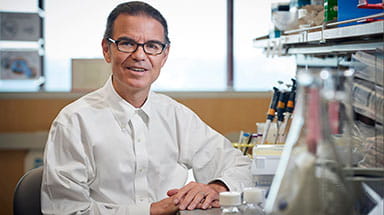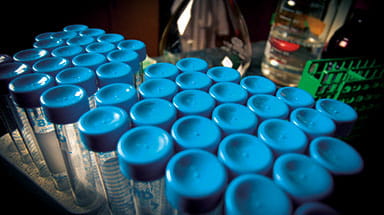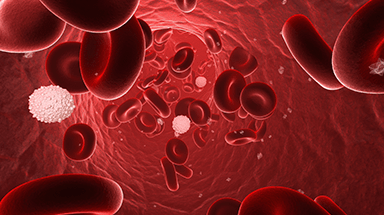Stem Cell Transplant Process
Your blood cancer care team will work together to guide you through the stem cell transplant process.
Read more about the stem cell transplant process.UPMC Hillman Cancer Center is part of the UPMC family.
Explore this Section
A blood stem cell transplant is a procedure in which a patient’s blood-forming stem cells are replaced with blood-forming stem cells collected from a donor’s blood or bone marrow. These stem cells grow into all types of blood cells, including red blood cells, white blood cells (or immune cells), and platelets.
There are two major types of stem cell transplants:
Because most blood stem cells live in the bone marrow, blood stem cell transplants are sometimes called “bone marrow transplants”. True bone marrow transplantation involves harvesting bone marrow from a donor through a needle inserted through the hip bones while the donor is under general anesthesia. Stem cells used for transplantation may also come from umbilical cord blood collected from volunteers at childbirth.
Almost all stem cell transplants at UPMC are peripheral blood stem cell transplants. Donors are given medication to increase the number of stem cells circulating in their blood. These cells are then collected from the donor’s vein in a process called apheresis. Once collected, blood stem cells are delivered to the patient through a vein. These stem cells know where to go and will travel to the bone marrow where they will eventually grow into all types of blood cells, including new blood stem cells.
Learn more about the details of the stem cell transplant process here.
Most blood stem cell transplants are used to treat patients with blood cancers such as leukemia, myelodysplastic syndromes, lymphoma or multiple myeloma. Blood stem cell transplantation can also be used to treat inherited disorders of blood cells such as sickle cell anemia or acquired noncancerous blood problems like aplastic anemia.
Autologous blood stem cell transplants are effective because they allow the delivery of a very high dose of chemotherapy, which kills more blood cancer cells than do conventional doses of chemotherapy which are given without a transplant. Autologous transplantation is mostly used to treat multiple myeloma and lymphoma and less commonly leukemia.
In an allogeneic transplant, in addition to allowing the delivery of high doses of chemotherapy, immune cells in the donor can recognize cells in the patient, including blood cancer cells, as foreign. These immune cells can then attack the cancer in a process called “graft-versus-leukemia”. Unfortunately, donor immune cells can also attack normal cells in the patient, causing “graft-versus-host disease”. In order to help to prevent graft-versus-host disease or make it less severe, all patients receive immunosuppressive medications. These medications also reduce the risk that the patient’s cells will reject the donor blood stem cells, which is uncommon. Allogeneic transplantation is most commonly used to treat leukemias and myelodysplastic syndromes but is also employed in treatment of some patients with lymphoma.
Our team of experts is prepared to treat graft-versus-host disease. We also offer a clinical trial developed by one of our program directors, Dr. Warren Shlomchik, which tests a new approach for reducing the risk of graft-versus-host disease. We offer other trials that test new drugs to treat graft-versus-host disease should it occur.
During the stem cell transplant process and recovery, recipients of both allogeneic or autologous transplant have low blood counts and suppressed immune systems, which puts them at an increased risk for infection and bleeding. Because of this, patients can expect to receive antibiotics and blood transfusions. Transplant recipients may also experience nausea, fevers, gastrointestinal problems, and mouth ulcers. Our experienced team at the UPMC Hillman Cancer Center is prepared to manage these and other side effects to help patients recover from the transplant process.
We take every precaution to avoid infection, including the use of a dedicated stem cell transplant recovery unit with reverse air flow and a high-efficiency particulate air (HEPA) filtration system. Our transplant-specific infectious disease physicians work closely with the stem cell transplant team to monitor and treat patients when infections arise.
The Stem Cell Transplantation Program of UPMC Hillman Cancer Center is the largest provider of stem cell transplant services in western Pennsylvania, averaging about 150 transplants each year, and is accredited by the Foundation for the Accreditation of Cellular Therapy.
Part of the Mario Lemieux Center for Blood Cancers, our program is committed to advancing stem cell transplant therapies. We work with the Blood and Marrow Transplant Clinical Trials Network to offer clinical trials of promising new transplant approaches for blood cancers and our physicians have developed, and are currently exploring, new protocols to improve outcomes.
To reach the Mario Lemieux Center for Blood Cancers call 412-864-6600.
For information about donating bone marrow, call 412-235-1052.

Stem Cell Transplant Process
Your blood cancer care team will work together to guide you through the stem cell transplant process.
Read more about the stem cell transplant process.
Types of Stem Cell Transplant
The types of stem cell transplants we offer include: allogenic transplant, autologous transplant, and syngenic transplant.
Read more about the types of stem cell transplant.
Clinical Trials
UPMC Hillman Cancer Center offers patients access to the latest advances in stem cell transplant through cancer clinical trials.
Find clinical trials for stem cell transplant.